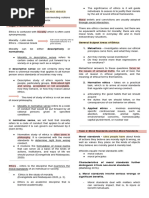Conventional Morality
Conventional Morality
Uploaded by
Jova BabeloniaCopyright:
Available Formats
Conventional Morality
Conventional Morality
Uploaded by
Jova BabeloniaOriginal Title
Copyright
Available Formats
Share this document
Did you find this document useful?
Is this content inappropriate?
Copyright:
Available Formats
Conventional Morality
Conventional Morality
Uploaded by
Jova BabeloniaCopyright:
Available Formats
MODULE 1 4.
We are not obligated to do the
impossible.
There is no widely agreed-on definition
of morality. The absence of a definition 5.Children bear less moral responsibility
does not leave us entirely in the dark, than adults.
however.
6.Justice is a very important moral good.
What we can do is to get a good sense
7.Deliberately hurting other people
of our subject matter by doing two
requires justification.
things:
8.Equals ought to be treated equally.
1.Being clear about the difference
between conventional and critical 9.Self-interest isn’t the only ethical
morality consideration.
2.Distinguishing morality with other 10.Agony/suffering is bad.
normative systems.
11.Might does not make right.
Conventional Morality
12.Free and informed requests prevent
the system of widely accepted rules rights violations.
and principles, that members of a Other Normative Systems
culture or society use to govern their
own lives. We can also better understand
morality by contrasting its principles
Critical Morality with those of other normative
systems.
It refers to the moral standards that Other normative systems also
are independent of conventional represent a set of standards for how
morality and can be used to critically we ought to behave, ideals to aim
evaluate its merits. for, rules that we should not break
but are different from morality.
Three core areas of moral philosophy There are many such systems, but
Value theory let’s restrict our focus to four of the
most important of them: those that
Normative ethics
govern the law, etiquette, self-
Metaethics
interest, and tradition.
The Divine Command Theory
Moral Starting Points
The basic idea is that God decides
1.Neither the law nor tradition is immune
what is right and wrong.
from moral criticism.
Actions that God commands are
2.Everyone is morally fallible. morally required; actions that God
forbids are morally wrong, and all
3.Friendship is valuable. other actions are permissible or
merely morally neutral.
Summary / Key
each individual affected by one’s
Takeaways decision.
Module 2
Skepticism in Ethics
Ethical Egoism claims that each
Reason and Impartiality person ought to pursue his or her
own self-interest exclusively.
Moral judgments must be backed by Psychological Egoism, by contrast,
good reasons; and second, morality asserts that each person does in
requires the impartial consideration fact pursue his or her own self-
of each individual’s interests. interest exclusively.
Moral Reasoning Cultural Relativism
If we want to discover the truth, we Main Idea: “Different cultures have
must let our feelings be guided as different moral codes. Therefore,
much as possible by reason. there are no universal moral truths,
This is the essence of morality. The the customs of different societies are
morally right thing to do is always the all that exist.
thing best supported by the
arguments.
The Requirement of Impartiality
Almost every important moral theory
includes the idea of impartiality.
This is the idea that each individual’s
interests are equally important; no
one should get special treatment.
Impartiality requires that we not treat
the members of particular groups as
inferior, and thus it condemns forms
of discrimination like sexism and
racism.
The Minimum Conception of Morality
Morality is, at the very least, the
effort to guide one’s conduct by
reason—that is, to do what there are
the best reasons for doing—while
giving equal weight to the interests of
What Is Morality?
Before investing yourself in the study of
1.1.3
an academic subject, it would be useful
to first have some idea of what you are
Conventional
getting yourself into. One way—
sometimes the best—to gain such an
understanding is by considering a
and Critical
definition. When you open your
trigonometry text or chemistry
Morality
handbook, you’ll likely be given, very
early on, a definition of the area you are
about to study. So, as your teacher, I
would seem to have a duty now to Conventional Morality
present you with a definition of morality.
Suppose you take sociology or an
Even if we want to we just simply can’t. anthropology course, and you get to a
There is no widely agreed-on definition unit on the morality of the cultures
of morality. The absence of a definition you’ve been studying. You’ll likely focus
does not leave us entirely in the dark, on the patterns of behavior to be found
however. (After all, no one has yet been in the cultures, their accepted ideas
able to offer informative definitions of about right and wrong, and the sorts of
literature, or life, or art, and yet we know character traits that these cultures find
a great deal about those things.) Indeed, admirable. These are the elements of
we can get a good sense of our subject what we can call conventional morality—
matter by doing these four things: the system of widely accepted rules and
principles, created by and for human
1. being clear about the difference beings, that members of a culture or
between conventional and critical society use to govern their own lives and
morality; to assess the actions and the
2. distinguishing the different branches of
motivations of others.
moral philosophy and their central
questions; Conventional morality can differ from
3. identifying starting points for moral society to society. The conventional
thinking; and morality of Saudi Arabia forbids women
4. contrasting morality with other normative
from publicly contradicting their
systems, including religious ones.
husbands or brothers, while Denmark’s
conventional morality allows this. People
in the United States would think it
That being said, Let’s get to work!
immoral to leave a restaurant without
tipping a good waiter or bartender, while
such behavior in many other societies is
perfectly OK.
Critical Morality
When we talk about morality in this
Moral
course, we will be referring to moral
standards that are not rooted in
Philosophy
widespread endorsement, but rather are
We all know that there are lots of moral
independent of conventional morality
questions. So it might help to impose
and can be used to critically evaluate its
some organization on them. This will
merits.
enable us to see the basic contours of
It’s possible, of course, that conventional moral philosophy and also to better
morality is all there is. But this would be appreciate the fundamental questions in
a very surprising discovery. Most of us each part of the field, you are about to
assume, as I will do, that the popularity study.
of a moral view is not a guarantee of its
truth. We could be wrong on this point, There are three core areas of
but until we have a chance to consider moral philosophy:
the matter in detail, I think it best to 1. Value theory
assume that conventional morality can
sometimes be mistaken. If so, then there What is the good life?
may be some independent, critical What is worth pursuing for its own sake?
morality that How do we improve our lot in life?
What is happiness, and is it the very
(1) does not have its origin in social same thing as well-being?
agreements;
(2) is untainted by mistaken beliefs, 2. Normative ethics
irrationality, or popular prejudices; and
What are our fundamental moral duties?
(3) can serve as the true standard for What makes right actions right?
determining when conventional morality Which character traits count as virtues,
has got it right and when it has fallen which as vices, and why?
into error. Who should our role models be?
Do the ends always justify the means, or
That is the morality whose nature we are are there certain types of action that
going to explore in this course. should never be done under any
circumstances?
3. Metaethics
1.1.4 The What is the status of moral claims and
advice?
Branches of Can ethical theories, moral principles, or
specific moral verdicts be true? If so,
what makes them true?
Can we gain moral wisdom? If so, how?
Do we always have a good reason to do
our moral duty?
1.1.5 Moral
views, and no human being is wholly
wise when it
comes to moral matters.
Starting Points 3. Friendship is valuable. Having
friends is a good thing. Friendships
(part 1)
add value to your life. You are better
off when there are people you care
deeply about, and who care deeply
about you.
4. We are not obligated to do the
impossible. Morality can demand
One of the puzzles about moral thinking only so much of us. Moral standards
is knowing where to begin. Some that are impossible to meet are
skeptics about morality deny that there illegitimate. Morality must respect
are any proper starting points for ethical our limitations.
reflection. They believe that moral 5. Children bear less moral
reasoning is simply a way of responsibility than adults. Moral
rationalizing our biases and gut feelings. responsibility assumes an ability on
This outlook encourages us to be lax in our part to understand options, to
moral argument and, worse, supports an make decisions in an informed way,
attitude that no moral views are any and to let our decisions guide our
better than others. While this sort of behavior. The fewer of these abilities
skepticism might be true, we shouldn’t you have, the less blameworthy you
regard it as the default view of ethics. are for any harm you might cause.
We should accept it only as a last resort. 6. Justice is a very important moral
In the meantime, let’s consider some good. Any moral theory that treats
fairly plausible ethical assumptions, justice as irrelevant is deeply
claims that can get us started in our suspect. It is important that we get
moral thinking. The point of the exercise what we deserve, and that we are
is to soften you up to the idea that we treated fairly.
are not just spinning our wheels when
thinking
morally. There are reasonable
constraints that can guide us when
thinking about how to live. Here are 1.1.5 Moral
Starting Points
some of them:
1. Neither the law nor tradition is
immune from moral criticism. The
law does not have the final word on (part 2)
what is right and wrong. Neither
does tradition. Actions that are legal,
or customary, are sometimes morally ...this is a continuation from the previous
mistaken. page.
2. Everyone is morally fallible.
Everyone has some mistaken ethical
7. Deliberately hurting other people First, this short list isn’t meant to be
requires justification. The default exhaustive. It could be made much
position in ethics is this: do no harm. It is longer.
sometimes morally acceptable to harm Second, we are not claiming that the
others, but there must be an excellent items on this list are beyond
reason for doing so or else the harmful criticism. We are only saying that
behavior is unjustified. each one is very plausible. Hard
thinking might weaken our
8. Equals ought to be treated equally. confidence in some cases. The
People who are alike in all relevant point, though, is that without such
respects should get similar treatment. scrutiny, it is perfectly reasonable to
When this fails to happen—when racist begin our moral thinking with the
or sexist policies are enacted, for items on this list.
instance—then something has gone Third, many of these claims require
wrong. interpretation in order to apply them
9. Self-interest isn’t the only ethical in a satisfying way. When we say, for
consideration. How well-off we are is instance, that equals ought to be
important. But it isn’t the only thing of treated equally, we leave all of the
moral importance. Morality sometimes interesting questions open. (What
calls on us to set aside our own interests makes people equals? Can we treat
for the sake of others. people equally without treating them
in precisely the same way? And so
10. Agony is bad. Excruciating physical on.)
or emotional pain is bad. It may
sometimes be appropriate to cause such A morality that celebrates genocide,
extreme suffering, but doing so requires torture, treachery, sadism, hostility, and
a very powerful justification. slavery is, depending on how you look at
it, either no morality at all or a deeply
11. Might doesn’t make right. People in failed one. Any morality worth the name
power can get away with lots of things will place some importance on justice,
that the rest of us can’t. That doesn’t fairness, kindness, and reasonableness.
justify what they do. That a person can
escape punishment is one thing—
whether his actions are morally
acceptable is another.
1.2.2 Other
12. Free and informed requests prevent
rights violations. If, with eyes wide open
Normative
and no one twisting your arm, you ask
someone to do something for you, and Systems
she does it, then your rights have not
been violated— even if you end up hurt We can also better understand morality
as a result. by contrasting its principles with those of
other normative systems. Each of these
There are a number of points to make represents a set of standards for how
about these claims. we ought to behave, ideals to aim for,
rules that we should not break.
There are many such systems, but let’s behave virtuously are sometimes
restrict our focus to four of the most punished, rather than rewarded, for it.
important of them: those that govern the Whistleblowers who reveal a company’s
law, etiquette, self-interest, and tradition. or a government official’s corruption are
often attacked for their efforts sued to
Law the point of bankruptcy, and targeted for
their courageous behavior. Though the
The fact that a law tells us to do
relation between self-interest and
something does not settle the question
morality is contested, it is a plausible
of whether morality gives its stamp of
starting point to assume that morality
approval.
can sometimes require us to sacrifice
Some immoral acts (like cheating on a
our well-being, and that we can
spouse) are not illegal. And some illegal
sometimes improve
acts (like voicing criticism of a dictator)
our lot in life by acting unethically.
are not immoral. Certainly, many laws
require what morality requires and forbid Tradition
what morality forbids. But the fit is hardly
perfect, and that shows that morality is Finally, morality is also distinct from
something different from the law. That a tradition. That a practice has been
legislature passed a bill is not enough to around a long time does not
show that the bill is morally acceptable. automatically make it moral. Morality
sometimes requires a break with the
Etiquette past, as it did when people called for the
abolition of slavery or for allowing
We see the same imperfect fit when it
women to vote. And some
comes to standards of etiquette. Forks
nontraditional, highly innovative
are supposed to be set to the left of a
practices may be morally excellent. The
plate, but it isn’t immoral to set them on
longevity of a practice is not a foolproof
the right. Good manners are not the
test of its morality.
same thing as morally good conduct.
Morality sometimes requires us not to be
polite or gracious, as when someone
threatens your children or happily tells
1.2.3 Morality
you a racist joke. So the standards of
etiquette can depart from those of
morality.
and Religion
Self-interest
The Presumed Connection
The same is true when it comes to the
between Morality and Religion
standards of self-interest. Think of all of
the people who have gotten ahead in life In popular thinking, morality and religion
by betraying others, lying about their are inseparable: People commonly
past, breaking the rules that others are believe that morality can be understood
following. It’s an unhappy thought, but a only in the context of religion. Thus the
very commonsensical one: you clergy are assumed to be authorities on
sometimes can improve your lot in life morality.
by acting immorally. And those who When viewed from a non-religious
perspective, the universe seems to be a 1. This conception of morality is
cold, meaningless place, devoid of value mysterious.
and purpose. 2. This conception of morality makes
God’s commands arbitrary.
The Divine Command Theory 3. This conception of morality provides the
wrong reasons for moral principles.
The basic idea is that God decides what
is right and wrong. Actions that God The second option has a different
commands are morally required; actions drawback.
that God forbids are morally wrong, and
all other actions are permissible or In taking it, we abandon the theological
merely morally neutral. conception of right and wrong. When we
say that God commands us to be
This theory has a number of attractive truthful because truthfulness is right, we
features. acknowledge a standard that is
independent of God’s will. The rightness
It immediately solves the old problem of exists prior to God’s command and is
the objectivity of ethics. Ethics is not the reason for the command.
merely a matter of personal feeling or
social custom. Whether something is
right or wrong is perfectly objective: It is
right if God commands it and wrong if
God forbids it.
The Divine Command Theory explains
why any of us should bother with
morality. Why shouldn’t we just look out
for ourselves? If immorality is the
violation of God’s commandments, then
there is an easy answer: On the day of
final reckoning, you will be held
accountable.
There are, however, serious problems
with the theory.
Atheists would not accept it, because
they do not believe that God exists.
But there are difficulties even for
believers. One can be skeptical and ask,
is a conduct right because the gods
command it, or do the gods command it
because it is right? This is a question of
whether God makes the moral truths
true or whether he merely recognizes
that they’re true.
First, we might say that right conduct is
right because God commands it. But this
idea encounters several difficulties.
2.1.2 Moral
Next, we can bring moral principles into
play. In our three examples, a number of
principles were involved: that we should
Reasoning in not “use” people; that we should not kill
one person to save another; that we
Ethical Issues
should do what will benefit the people
affected by our actions; that every life is
sacred; and that it is wrong to
discriminate against the handicapped.
Most moral arguments consist of
principles being applied to particular
Reason and Impartiality cases, and so we must ask whether the
principles are justified and whether they
Moral judgments must be backed by
are being applied correctly.
good reasons; and second, morality
requires the impartial consideration of The rote application of routine methods
each individual’s interests. is never a satisfactory substitute for
critical thinking, in any area. Morality is
Moral Reasoning no exception.
When we feel strongly about an issue, it The Requirement of
is tempting to assume that we just know
what the truth is, without even having to Impartiality
consider arguments on the other side.
Unfortunately, however, we cannot rely Almost every important moral theory
on our feelings, no matter how powerful includes the idea of impartiality. This is
they may be. Our feelings may be the idea that each individual’s interests
irrational; they may be nothing but the are equally important; no one should get
by-products of prejudice, selfishness, or special treatment. At the same time,
cultural conditioning. impartiality requires that we do not treat
the members of particular groups as
Thus, if we want to discover the truth, inferior, and thus it condemns forms of
we must let our feelings be guided as discrimination like sexism and racism.
much as possible by reason. This is the
essence of morality. The morally right
thing to do is always the thing best 2.1.3 The Minimum
supported by the arguments. Of course,
not every reason that may be advanced Conception of
is a good reason. There are bad
arguments as well as good ones, and Morality
much of the skill of moral thinking
consists in discerning the difference.
The first thing is to get one’s facts
straight. The facts exist independently of
our wishes, and responsible moral
thinking begins when we try to see
things as they are.
Egoism and
The Minimum Conception of
Morality
We may now state the minimum
conception: Morality is, at the very least, Ethical Egoism
the effort to guide one’s conduct by
reason—that is, to do what there are the
best reasons for doing—while giving
equal weight to the interests of each
individual affected by one’s action.
This paints a picture of what it means to
be a conscientious moral agent. The
conscientious moral agent is someone
who is concerned impartially with the
interests of everyone affected by what
he or she does; who carefully sifts facts
and examines their implications; who
accepts principles of conduct only after
scrutinizing them to make sure they are
justified; who will “listen to reason” even
when it means revising prior convictions;
and who, finally, is willing to
act on these deliberations.
We respond differently when there is a
As one might expect, not every ethical “crisis.”
theory accepts this “minimum.” This
picture of the conscientious moral agent We have duties to others simply
has been disputed in various ways. because they are people who could be
However, theories that reject it helped or harmed by what we do. If a
encounter serious difficulties. This is certain action would benefit (or harm)
why most moral theories embrace the other people, then that is a reason why
minimum conception, in one form or we should (or should not) perform that
another. action. The common-sense assumption
is that other people’s interests count,
2.2.2 Two from a moral point of view.
Some people believe that we have no
Types of duties to others. On their view, known as
Ethical Egoism, each person ought to
pursue his or her own self-interest
Egoism - exclusively. This is the morality of
selfishness. It holds that our only duty is
Pyschological to do what is best for ourselves. Other
people matter only insofar as they can
benefit us.
Moreover, within a community, a
Ethical Egoism claims that each person dominant male might demand—and get
ought to pursue his or her own self- —regular sexual access to other men’s
interest exclusively. People ought to be wives. The women, however, were free
self-interested and that our neighbors to break these arrangements simply by
ought not to give to charity. Ethical leaving their husbands and taking up
Egoism makes a claim about morality, or with new partners—free, that is, so long
about the way things should be. as their former husbands chose not to
make too much trouble. All in all, the
Psychological Egoism, by contrast, Eskimo custom of marriage was a
asserts that each person does, in fact, volatile practice that bore little
pursue his or her own self-interest resemblance to our custom.
exclusively. People are self-interested
and that our neighbors will not give to
charity. Psychological Egoism makes a
claim about human nature, or about the Cultural Relativism
way things are.
Main Idea: “Different cultures have
different moral codes. Therefore, there
are no universal moral truths, the
2.2.4 Cultural customs
of different societies are all that exist.
Relativismcritic The following claims have all been made
al
by cultural relativists:
1. Different societies have different moral
codes; that a certain action is right, then
that action is right, at least within that
society.
Different Cultures Have 2. There is no objective standard that can
Different Moral Codes be used to judge one society’s code as
better than another’s. There are no
moral truths that hold for all people at all
The Callatians, who lived in India, ate
times.
the bodies of their dead fathers. The 3. The moral code of our own society has
Greeks, of course, did not do that—the no special status; it is but one among
Greeks practiced cremation and many.
regarded the funeral pyre as the natural 4. It is arrogant for us to judge other
and fitting way to dispose of the dead. cultures. We should always be tolerant
The Eskimos lived in small settlements, of them.
separated by great distances, and their 5. The moral code of a society determines
customs turned out to be very different what is right within that society; that is, if
from ours. The men often had more than the moral code of a society says it is.
one wife, and they would share their
wives with guests, lending them out for
the night as a sign of hospitality.
Cultural Relativism provides an antidote
The Cultural Differences for this kind of dogmatism. Realizing this
can help broaden our minds. We can
Argument see that our feelings are not necessarily
perceptions of the truth— they may be
1. Different cultures have different moral due to cultural conditioning and nothing
codes.
more.
2. Therefore, there is no objective truth in
morality. Many of the practices and attitudes we
3. Right and wrong are only matters of find natural are really only cultural
opinion, and opinions vary from culture products.
to culture.
What Follows from
Cultural Relativism
1. We could no longer say that the
customs of other societies are morally
inferior to our own.
2. We could no longer criticize the code of
our own society.
3. The idea of moral progress is called into
doubt.
What We Can Learn from
Cultural Relativism
First, claims warns us, quite rightly,
about the danger of assuming that all of
our practices are based on some
absolute rational standard. They are not.
Some of our customs are merely
conventional—merely peculiar to our
society—and it is easy to lose sight of
that fact. Cultural Relativism begins with
the insight that many of our practices
are like this—they are only cultural
products.
The second lesson has to do with
keeping an open mind. As we grow up,
we develop strong feelings about things:
We learn to see some types of behavior
as acceptable, and other types as
outrageous.
You might also like
- The Politics of IndividualismDocument130 pagesThe Politics of IndividualismMongrelkoi100% (1)
- Morality and The Criminal LawDocument5 pagesMorality and The Criminal LawLegalLightNo ratings yet
- Republic Act 11476: Rhea B. Reyman DiscussantDocument11 pagesRepublic Act 11476: Rhea B. Reyman Discussantrhea60% (5)
- Moral Development and Moral EducationDocument11 pagesMoral Development and Moral Educationkristal_gianan08No ratings yet
- Accenture Raising Legal and Ethical Concerns and Prohibiting RetaliationDocument5 pagesAccenture Raising Legal and Ethical Concerns and Prohibiting RetaliationAindrila BeraNo ratings yet
- EthicsDocument6 pagesEthicsNICOLE ADRIENNE RIVERANo ratings yet
- Moral ReasoningDocument5 pagesMoral ReasoningMon RamNo ratings yet
- ETHICSDocument23 pagesETHICSFOEBE MARREY MANUELNo ratings yet
- Module 1-6 - EthicsDocument34 pagesModule 1-6 - EthicsCaila PanerioNo ratings yet
- Module 1 MORALITYDocument3 pagesModule 1 MORALITYMon RamNo ratings yet
- Morality$Ethics 1st$2nd ClassDocument44 pagesMorality$Ethics 1st$2nd ClassKitesa AyanaNo ratings yet
- Module 1 & 2 EthicsDocument11 pagesModule 1 & 2 EthicsRosemarie CruzNo ratings yet
- Ethics Module 1-5Document2 pagesEthics Module 1-5francisteo35No ratings yet
- Ethics Module 1Document65 pagesEthics Module 1Fairuza SulaimanNo ratings yet
- ETHICS (1st Year-1st Sem)Document9 pagesETHICS (1st Year-1st Sem)Deborah AquinoNo ratings yet
- Unit 1 (Ethics)Document31 pagesUnit 1 (Ethics)Uttam Kumar SahNo ratings yet
- 1.0 What Is Ethics? 1.1 Importance of EthicsDocument17 pages1.0 What Is Ethics? 1.1 Importance of EthicsMoMMy MheiiNo ratings yet
- Module 1 Basic Concepts and IssuesDocument6 pagesModule 1 Basic Concepts and Issuesno.jam.teamNo ratings yet
- Module 1 Fundamental Principle of EthicsDocument10 pagesModule 1 Fundamental Principle of EthicsMarvic AboNo ratings yet
- Lesson 1 ETHICSDocument2 pagesLesson 1 ETHICSGelie AceNo ratings yet
- Module 1 Basic Concepts and IssuesDocument6 pagesModule 1 Basic Concepts and Issuessofie limNo ratings yet
- Introduction To Moral PhilosophyDocument1 pageIntroduction To Moral PhilosophyElla Marie Lopez100% (1)
- Ethics Prelim TopicsDocument95 pagesEthics Prelim TopicsAndrie PelarioNo ratings yet
- Ethics NotesDocument5 pagesEthics NotesChristaniel LangerNo ratings yet
- Reviewer in EthicsDocument7 pagesReviewer in Ethics2023201040No ratings yet
- Chapter OneDocument60 pagesChapter OnerreeddiiaattNo ratings yet
- Ethics-Reviewer (1)Document19 pagesEthics-Reviewer (1)Philip MiguelNo ratings yet
- Ethics RevDocument13 pagesEthics Revyuki.108sclsNo ratings yet
- ETHICS ReviewerDocument9 pagesETHICS ReviewerLiana Louisse JoseNo ratings yet
- Culture and EthicsDocument27 pagesCulture and Ethicsjanessen caliyoNo ratings yet
- Ethics Midterms With Finals Reviewer Module 1 6Document23 pagesEthics Midterms With Finals Reviewer Module 1 6Queency BayaNo ratings yet
- Chapter 1: Introduction To Ethics: GADTC: Ethics (Unit I)Document3 pagesChapter 1: Introduction To Ethics: GADTC: Ethics (Unit I)Prince Mark RodaNo ratings yet
- EthicsDocument11 pagesEthicskyla manzanoNo ratings yet
- What Is EthicsDocument4 pagesWhat Is Ethicsjohnpadin696No ratings yet
- Ethics MidtermDocument25 pagesEthics MidtermNicole Garcia NitroNo ratings yet
- Ethics NotesDocument4 pagesEthics NotesAnthony James E. VillanuevaNo ratings yet
- ETHICS Ch2Document2 pagesETHICS Ch2Sedrick MetraNo ratings yet
- Business Ethics Unit 1Document18 pagesBusiness Ethics Unit 1Sakshi RoyNo ratings yet
- Defining EthicsDocument11 pagesDefining EthicsElaiyah Jalija Gutierrez CapistranoNo ratings yet
- Lesson 1Document10 pagesLesson 1Vũ Hồng NgọcNo ratings yet
- Ethix L1 68 9Document11 pagesEthix L1 68 9cadavizeloisaNo ratings yet
- Catholicethicsintodaysworld ShortDocument5 pagesCatholicethicsintodaysworld ShortJennylyn Alumbro DiazNo ratings yet
- Ethics m1 m2Document5 pagesEthics m1 m2gianrosario456No ratings yet
- Lesson 1Document2 pagesLesson 1Pong MartilloNo ratings yet
- EthicsDocument28 pagesEthicsAdrian De DiosNo ratings yet
- Ethics MidtermsDocument5 pagesEthics MidtermsRay Siemon MatalogNo ratings yet
- Morality and Professional EthicsDocument96 pagesMorality and Professional Ethicstemesgen AsmamawNo ratings yet
- Ethics: Definition, Activities, and ExamplesDocument9 pagesEthics: Definition, Activities, and ExamplesAllan Jr. Agao-AgaoNo ratings yet
- Reviewer ETHICSDocument7 pagesReviewer ETHICSLAIZA MARIE MANALO100% (1)
- Ethics and Its SubdividionsDocument6 pagesEthics and Its SubdividionsHwangNo ratings yet
- Criminology 4 Professional Conduct and Ethical Standards Revised Notes23Document30 pagesCriminology 4 Professional Conduct and Ethical Standards Revised Notes23Dave julius CericoNo ratings yet
- Lesson 1: Orientation of The CourseDocument28 pagesLesson 1: Orientation of The CourseVictoria Manalaysay0% (1)
- Celaws Chapter 01Document5 pagesCelaws Chapter 01Mark Uge Eugene TongolNo ratings yet
- ETHICS - 2nd Year College REVIEWERDocument8 pagesETHICS - 2nd Year College REVIEWERMa. Angelica Aira Romero Beluang100% (1)
- Topics To Be Covered: Ethics and Morality Relates To "Right" and "Wrong" Conduct. While They AreDocument3 pagesTopics To Be Covered: Ethics and Morality Relates To "Right" and "Wrong" Conduct. While They AreKshitij NegiNo ratings yet
- Topic 1 - The Moral AgentDocument27 pagesTopic 1 - The Moral AgentMJ NuarinNo ratings yet
- Ethics: Rules and Its PurposeDocument6 pagesEthics: Rules and Its PurposeJames Luis PartosaNo ratings yet
- ETHICSDocument11 pagesETHICSMacul VinceNo ratings yet
- Ethics 1st Shifting NoteeeesDocument10 pagesEthics 1st Shifting NoteeeesRuvie Zyra Go CapangpanganNo ratings yet
- Ilovepdf MergedDocument91 pagesIlovepdf MergedDenzel Luna QuiambaoNo ratings yet
- ITIKS REVIEWERDocument8 pagesITIKS REVIEWERAllona Jane BrionesNo ratings yet
- Ethics ReviewerDocument4 pagesEthics ReviewerJAYVEE LASCUNANo ratings yet
- EthicsDocument64 pagesEthicsCindy DivinaNo ratings yet
- Ethics ReviewerDocument5 pagesEthics ReviewerDe Zuniga AireishNo ratings yet
- CG - HRMA102 - Administrative & Office ManagementDocument14 pagesCG - HRMA102 - Administrative & Office Managementchristened.pupclassNo ratings yet
- Responsibility For The OtherDocument4 pagesResponsibility For The OtherJoana YeeNo ratings yet
- Bibliography: Friedrich NietzscheDocument3 pagesBibliography: Friedrich NietzscheMarco CrespoNo ratings yet
- Inaugural Dissertation KantDocument7 pagesInaugural Dissertation KantWriteMyPaperForMeCheapUK100% (1)
- IMM105 v2-0 Course Outline 2020-0625 PDFDocument4 pagesIMM105 v2-0 Course Outline 2020-0625 PDFAmzion0% (1)
- Professor John Gardner FBA : Detailed Curriculum VitaeDocument17 pagesProfessor John Gardner FBA : Detailed Curriculum VitaeVannak2015No ratings yet
- mgmt08 Notes PDFDocument2 pagesmgmt08 Notes PDFShakkhor ChowdhuryNo ratings yet
- The Discipline of Building CharacterDocument28 pagesThe Discipline of Building CharacterArathi AnuNo ratings yet
- Conflict Theory PDFDocument14 pagesConflict Theory PDFanukriti meenaNo ratings yet
- Lussier4ePPT ch02Document44 pagesLussier4ePPT ch02Chelliah SelvavishnuNo ratings yet
- Course Outline Introduction To Social WorkDocument3 pagesCourse Outline Introduction To Social WorkDr Aleu Garang AleuNo ratings yet
- Kindness Is A Virtue That Is Rarely Found These DaysDocument6 pagesKindness Is A Virtue That Is Rarely Found These DaysJustine Joy AlinaNo ratings yet
- Sapontzis - in Defense of The PigDocument14 pagesSapontzis - in Defense of The PigAaron SylvestreNo ratings yet
- Quali ReviewerDocument44 pagesQuali ReviewerReymond ValeraNo ratings yet
- Text Completion SampleDocument8 pagesText Completion SampleNadeem ArainNo ratings yet
- Hun 101 1 To 3 ModulesDocument41 pagesHun 101 1 To 3 ModulesFaris BashaNo ratings yet
- #6Document3 pages#6Angelika PinedaNo ratings yet
- DPB30083 Business Ethics Assessment: Case Study 1 Dbs5A Lecturer: Madam Tan Kang Yee Prepared byDocument4 pagesDPB30083 Business Ethics Assessment: Case Study 1 Dbs5A Lecturer: Madam Tan Kang Yee Prepared byRaden BalqisNo ratings yet
- Lecture Slide EthicsDocument750 pagesLecture Slide EthicsShreyansh Agarwal100% (1)
- Leadership, Ethics, and Entrepreneurship 4Document29 pagesLeadership, Ethics, and Entrepreneurship 4cementmavu21No ratings yet
- Characteristics of Good ResearchDocument72 pagesCharacteristics of Good ResearchNanette A. Marañon-SansanoNo ratings yet
- Workshop On Indian EthosDocument61 pagesWorkshop On Indian EthosAYUSH GOEL100% (1)
- Philosophy of ManDocument2 pagesPhilosophy of ManCamille Hisona CañasNo ratings yet
- OUMH3203Document12 pagesOUMH3203Ibrahim Drahman100% (1)
- TTC Taskforce ReportDocument79 pagesTTC Taskforce ReportMwachereShumaNo ratings yet

























































































